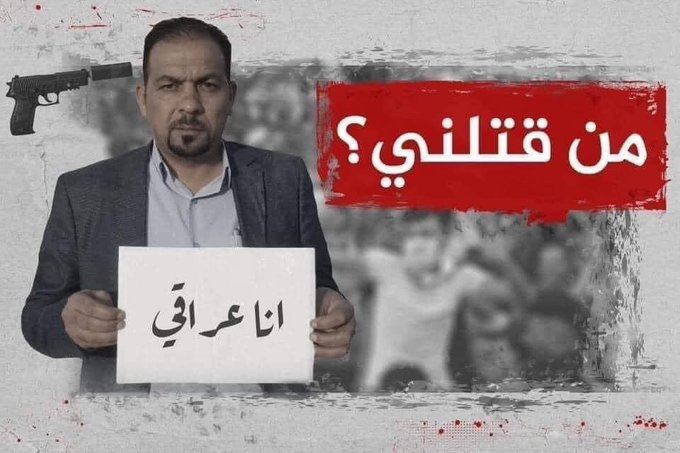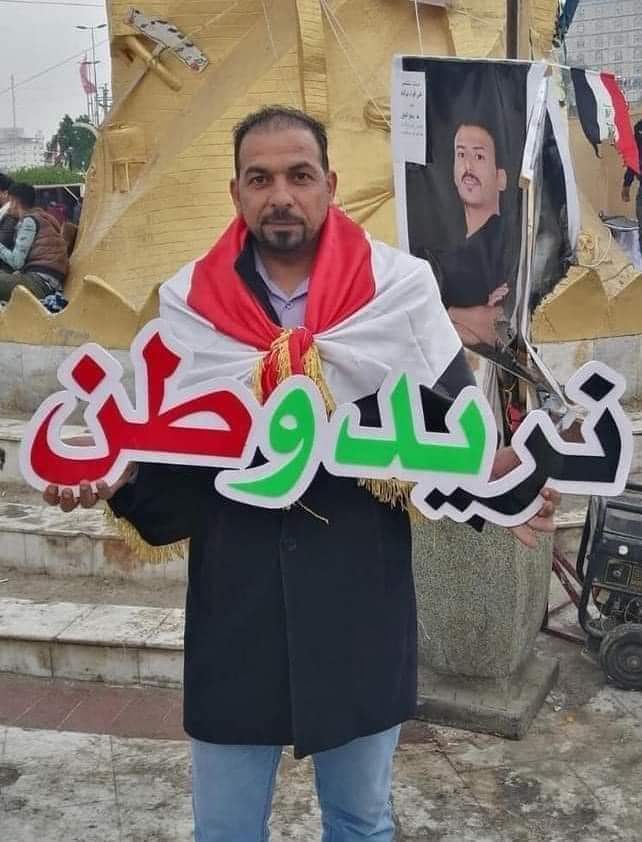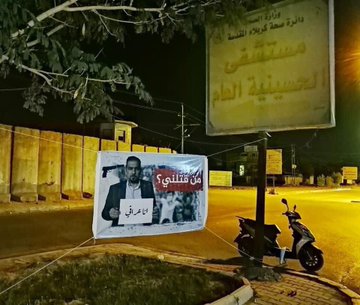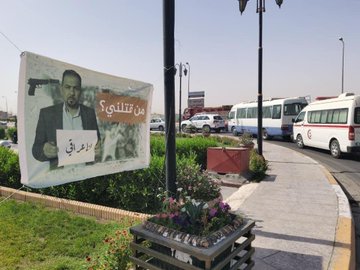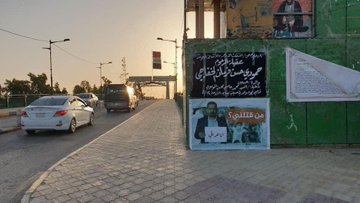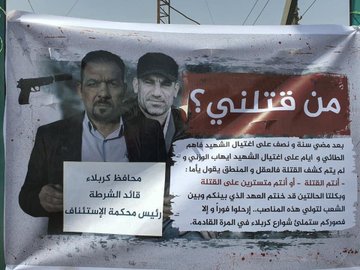Starting with Jimmy Dore:
A new party? The US needs it really badly.
We also need to see the government of Israel stop attacking the Palestinian people. Daniel Sanjursen (ANTIWAR.COM) notes:
There hadn’t been much talk of the Israel-Palestine conflict. Nor had there been serious attempts at diplomacy, of Washington brokering a settlement. The reasons were manifold: part apathy, part outrage-exhaustion, part Donald Trump’s intentionally ditching the illusion of America-the-honest-broker and decisively swinging support to one side (Israel), and part Joe Biden’s desire to avoid the controversy of getting embroiled in seemingly hopeless Mideast conflict third-rails. Yet despite increasingly right-wing Israeli intransigence, and American apathy or antagonism, the Palestinian people – not their divided and corrupt Fatah or Hamas "leaders" – refused to be silenced. Few Western commentators counted on that. They should have.
These are resilient people, the Palestinians, and they’ve never gone gently into that good erasure or apartheid night. Just as their youths surprised Israel, the world, and their own exiled leaders, and rose in response to decades of structural disenfranchisement and security force-brutality – in the First Intifada ("Shaking Off") of 1987 – today a new generation of stateless, open air prisoners are again willing their way into the global spotlight.
On (and Off ) Script
The current uprising – and cruelly disproportionate Israeli military response – has both followed and strayed from the standard script of modern Holy Land conflict. It began with heavy-handed police suppression – including a violent raid on the Al Aqsa Mosque during Ramadan – of Palestinians protesting far-right Israeli extremist provocations and (illegal) government-backed eviction efforts spearheaded by (illegal) Israeli settlers in the Sheikh Jarrah neighborhood of (illegally) occupied East Jerusalem.
Hamas threatened a response, gave an ultimatum to the Israeli government to cease its actions, then launched a barrage of (mostly) inaccurate, though occasionally lethal (10 Israelis killed, including two children, as of Sunday night), rockets over the border from their Gaza Strip power base. The Israeli Defense Forces (IDF) then immediately mobilized and retaliated with Trump-like "fire and fury" on Gaza. The lopsided casualty disparity spoke for itself: 10 Israeli deaths versus 207 Palestinian fatalities – including 92 women and children – in the West Bank and Gaza, a 20-to-1 ratio. That much was grotesquely standard.
Only this time around there’ve been curveballs, both promising and tragic. The first, is a limited – but significant – sea change in American public opinion and progressive Democrat’s political positions on Israel-Palestine. The second is the widespread outbreak of communal violence – which is approaching a potential civil war – among civilians in mixed Arab-Jewish cities throughout the country (More on this in a follow-up column). The former is favorable, the latter – frightening.
Still, despite rumblings of change in U.S. political and public opinion, most American policymaker statements, and media reports, have hewed to a criminally misleading myth, whereby what’s happening in occupied Palestine is an ancient and insoluble clash between military and moral equals. In other words, American journalists are again trapped in the old objectivity delusion. We’ve seen it before.
And here's an important Tweet from Fiorella Isabel:
Lastly, be sure to read Ava and C.I.'s "Media: Gay Rights and Gay Wrongs" -- they continue to break new ground. 15 years and counting.
Here's C.I.'s "Iraq snapshot:"
Despite being filled with thousands of surveillance cameras, main streets and popular squares have witnessed political and human rights activists being gunned down, with the executioners always vanishing into thin air, filled with confidence that their images would never be caught on tape.
Only last week, activist Ihab Al-Wazni, who was leading protests in the Iraqi city of Karbala, was assassinated in front of his own home by a motorcyclist. Al-Wazni’s neighborhood is one of the most protected areas due to its proximity to Shiite holy sites.
Al-Wazni, like millions of other Iraqis, yearned for a homeland that gives his children hope for a brighter future. A previous attempt to kill him in 2019 did not stop him from continuing to stand against tyranny. He was vocal about the dangers of the regime in Tehran, about the corruption of the Islamists in his province, and about the importance of maintaining the peaceful and focused nature of the protests.
The assassination process in Iraq starts with one of two types of fatwa issued by religious politicians like Shiite cleric Muqtada Al-Sadr, who is known for operating one of the biggest and most brutal pro-Iran militias in the country. The Mahdi Army (Saraya Al-Salam), which was created in July 2003, is responsible for the deaths of thousands of innocent people around the country. It is led by ruthless thugs. Al-Sadr was once wanted for his role in the assassination of senior Shiite cleric Mohammed Baqir Al-Hakim in the city of Najaf. Ironically, he described Al-Wazni’s murder as a “cowardly” act, calling on the government to bring the perpetrators to justice.
He was shot to death at night outside his home by men on motorbikes in an ambush caught on surveillance tapes. His death has been confirmed by security forces and fellow activists.
Wazni narrowly escaped death in December 2019, when men on motorbikes used silenced weapons to kill fellow activist Fahem al-Tai as Wazni was dropping him off at his home in Karbala, where pro-Tehran armed groups are legion.
Both men were key figures in a national protest movement that erupted against government corruption and Iranian interference in Iraq in October 2019. More than 600 people have been killed as a result – many on the streets during rallies, others targeted on their doorsteps, away from the demonstrations.
Protests broke out in Karbala, Nassiriya, and Diwaniya in southern Iraq in reaction to Wazni's killing, as people called for an end to the bloodshed and rampant corruption, as well as an end to the impunity enjoyed by Shia militias.
In a video recording from the morgue where Wazni's body was initially held, a fellow activist made it clear who he and colleagues blamed for the killing.
"It is the Iranian militias who killed Ihab," said the unnamed activist. "They are going to kill all of us! They threaten us and the government remains silent."
The assassination of Wazni was followed 24 hours later with the attempted murder of journalist Ahmad Hassan who was shot in the head as he arrived home in Diwaniyah. Hassan has undergone brain surgery and remains in critical condition at a Baghdad hospital.
The latest assassination victim was Ehab al-Wazni, one of the most prominent faces of the protest movement. He was killed in the city of Karbala on May 9, drawing widespread outrage and condemnation among the protesters.
Ensuing statements of condemnation declared a boycott of the polls, with activists seeking to make their voices heard on the streets rather than the ballots.
Iraqi researchers welcomed the move. Haidar Saeed said that Wazni’s assassination would persuade the “October forces” to refrain from backing the elections.
In contrast, however, the traditional political forces are more determined than ever to hold the elections on time.
There's little hope of Iraqi authorities bringing the killers of Ihab Al Wazni and other activists to justice, human rights groups and activists said.
The civil society activist was shot dead last week in Karbala. His death sparked daylong protests in the southern holy city that saw demonstrators block roads and bridges with burning tyres.
“The groups behind these killings are extremely powerful to the point that the Iraqi state and law enforcement system is unable to hold them to account,” Belkis Wille, a senior researcher at Human Rights Watch, told The National.
“It means we have incredibly powerful armed groups that can perpetrate crimes with impunity on the streets of Iraq in broad daylight and the state cannot do much to curb these attacks,” he said.
Calls to the Iraqi Prime Minister's office and the Interior Ministry failed to obtain a comment on the investigation. Iraqi authorities had opened an immediate investigation after the incident, but have yet to announce the perpetrators.
Real accountability and justice will not prevail and the attacks against members of Iraq’s civil society and journalists will continue as long as armed groups are able to “instill fear and silence criticism” Ms Wille said.
Militias linked to political parties, some backed by Iran, have tightened their grip over state institutions since the US invasion that toppled former dictator Saddam Hussein in 2003.
Prime Minister Mustafa Al Kadhimi, who took office in May, has pledged justice for activists killed or abused by armed groups, and has faced off against some Iran-backed parties.
Al Wazni’s assassination triggered outrage at the government’s lack of action in providing civilian protection, basic public services and jobs. Al Wazni was a vocal opponent of corruption, the stranglehold of Tehran-linked armed groups and Iran's influence in Iraq.
The United States will likely be involved in Iraq at some level for a long time. It still has contracting going on via the State Dept. Recently State’s Office of Inspector General looked at whether contracting activity was properly staffed to ensure oversight. For more, the Federal Drive with Tom Temin turned to the director of the OIG’s office of audits, Mike Vennemann.
Tom Temin: Mr. Vennemann, good to have you on.
Mike Vennemann: Thanks for having me, Tom.
Tom Temin: And in Iraq, then, of course, the military is gone. So it’s pretty much State Department is the United States in Iraq, is that fair to say?
Mike Vennemann: That’s fair to say. We still have a large presence there. And we have to execute our mission.
Tom Temin: And what is the scope of contracting that goes on there? Is it all related pretty much to maintenance of the mission?
Mike Vennemann: That’s the majority of the contracting things. I would consider Life Support Services, operations and maintenance, medical services, things like that, to execute the mission, support the staff.
Tom Temin: Alright. And a few years ago, you looked at the contracting activity itself, and found that certain required staff members that accompany a contracting officer, particularly the technical person, they used to call it the COTR. Now it’s the contracting officer’s representative, and the technical evaluator, were not part of a major contract. Tell us more what you found, then. And then we’ll fast forward to what you’ve found at the relook.
Mike Vennemann: Sure. So over the past five years, what we’ve found is that the contracts there, they have to have these CORs assigned to them, which require a certain level of expertise, that’s determined by [the Office of Management and Budget], and that’s gonna affect COR certification. So there’s a combination of education and experience. And when you have a larger contract, it requires a more extensive type oversight, so you need the most experienced people. And what we found is that within Iraq, it’s hard to staff those positions with the most qualified people to be the eyes and ears for the contracting officer.
Tom Temin: Is there any particular thing that they’re buying that particularly requires the COR, the core?
Mike Vennemann: All of those Life Support Services, we’re talking about billions of dollars of contracts. And these contracts, they do require somebody to have some technical expertise and subject matter expertise within life support services and operations and maintenance and medical services. Without that you have a potential vulnerability.
Tom Temin: Life Support Services means more than just medical. What is it they’re actually looking at?
Mike Vennemann: So life support services could be anything from food to fuel, we’re talking about waste services, water, etc. So anything that would support all of the Foreign Service officers to execute the mission.
Tom Temin: And so the acquisitions are principally from local contractors in Iraq, then.
Mike Vennemann: Well, the contractors are actually based out of the US and then they will subcontract to local vendors as necessary. It can be a combination of things.
